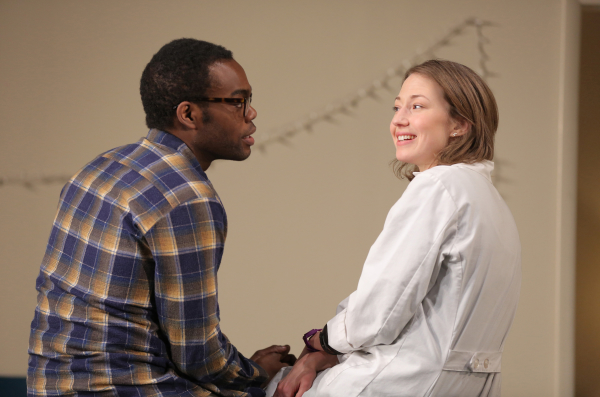Placebo

(© Joan Marcus)
"Shouldn't we be stalking happiness with a machete or something?" posits Louise, the female protagonist of Melissa James Gibson's new play Placebo, now running on the Playwrights Horizons mainstage.
"My dad had a machete," responds her stoic colleague Tom. "For brush clearing."
Emotions and mechanics frequently collide in such subtle yet intellectually explosive ways in Gibson's contemporary analysis of relationships and the things that propel them forward into the dark unknown.
Sex is surely an element that the play explores, but it takes on a much smaller role than Gibson's premise suggests. Carrie Coon leads the four-person cast brilliantly as Louise, a medical resident in the middle of conducting a double-blind placebo-controlled study of a new female arousal drug called Resurgo. As she clarifies to her boyfriend, Jonathan (an equally compelling performance by William Jackson Harper), who calls it the "female Viagra," the treatments are vastly different. "Viagra's purely about mechanics," she says. "This drug aims to get inside a woman's mind." True, by now we should all be keenly aware that men are from Mars and women are from Venus. But the distinction between the drugs poses interesting questions about the role the mind plays for all of us in every aspect of life — from the basest mechanics of sexual arousal to the most abstract concepts of eternal love.
Gibson starts us out with base mechanics, introducing us to Mary (Florencia Lozano) — a middle-aged woman and hopeful participant in Louise's study. Her libido has ground to a disturbing, and potentially marriage-threatening halt. Fortunately, she meets the two primary criteria for participation: She has (1) little sexual desire and (2) an intense desire for sexual desire. As she takes her daily pills — not knowing whether it's Resurgo or the chemically empty placebo — the hope that this latter form of desire brings becomes a medicine in and of itself. Yet, at the same time, it also becomes a test of "double-blind" faith, prodding her to decide whether it's time to cut her losses once and for all and hang up this elusive notion of a better tomorrow.
We sadly don't get to learn much more about Mary outside Louise's office, where Lozano makes the most of her character's emotional roller coaster in a few expertly delivered monologues. We do, however, delve deeply into Louise's private life with Jonathan, where these same questions begin to invade as subtly as the indistinguishable barrier between their apartment and the science lab. In set designer David Zinn's hybrid space, both share a kitchen, a makeshift wooden table, and uncomfortable plastic chairs, while shifts from soft to fluorescent lighting (designed by Matt Frey) mark the transitions from home to work.
At home, Louise admits to Jonathan that she inadvertently doled out another placebo of sorts, falsely informing her ailing mother that the two of them are newly engaged — a desperate attempt to shine a hopeful light on her mother's dwindling life. Jonathan meanwhile struggles with his own crisis of faith as a classics student who is one painful dissertation away from a PhD. It's a challenge that makes him begin to doubt his academic capabilities, and tangentially, doubt whether or not he and Louise are up to making their falsified future a reality. Ironically, Pliny the Elder, the subject of his dissertation, is an icon of fearless fortitude, known not only for his voluminous writings but also for his fatal attempt to rescue survivors from the eruption of Mount Vesuvius in AD 79.
Under the confident hand of director Daniel Aukin, Coon and Harper find the playful and disquietingly shaky ground of Louise and Jonathan's state of not-quite-adulthood. Both are undergoing significant transitions — as individuals, professionals, and halves of a potentially mature relationship. One moment, Louise throws around impressive medical jargon while Jonathan rattles off phrases in Latin (placebo, incidentally, translates as "I shall please"), and the next, a lover's quarrel will send Louise to a corner wrapped, fetus-like, in a blanket, while Jonathan reaches for a comforting pack of cigarettes. The two could leap together into life's next phase, but a chance at happiness may not be worth the risk of not knowing what comes next.
After all, Mary, who made that leap herself, is strongly second-guessing her lifelong commitments — though the alternative to Mary's route is to subscribe to the chilly philosophies of Louise's robotic coworker, Tom. Alex Hurt is perfect as this frat boy/scientist chimera, eventually letting some human feeling shine through his hermetically sealed exterior while nailing the text's deadpan humor (as does the rest of the stellar cast). However, before this minimal thaw, he doubts that "happiness" is even a reasonable expectation — a luxury mistaken for a right by a "bougie" populous.
Fitting for this group of hyper-intelligent characters, Gibson presents her ideas in a distinctly academic way — a style of writing that all too often activates the brain while leaving the heart cold. Fortunately, everything Gibson gives us in intellectual fodder she translates into emotional content, both surprising and original in its delivery. She leaves us intrigued not only to learn more about Pliny the Elder and his courageous journey toward Vesuvius, but to feel what it would be like to chase the volcano ourselves.










